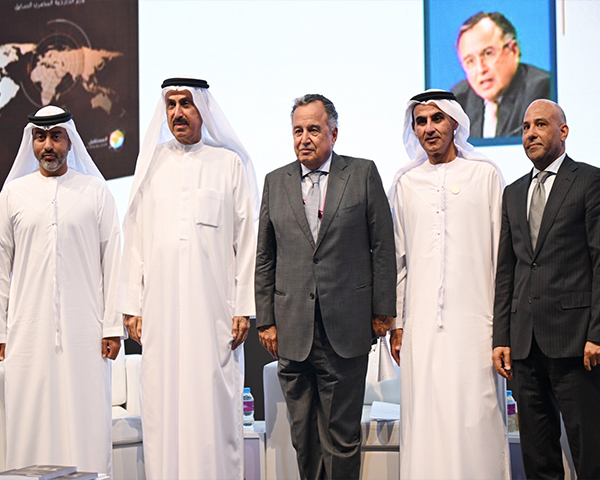In the presence of His Excellency Saqr Ghobash, President of the Federal National Council, Future Center for Advanced Research and Studies (FARAS) launched its first event at the Abu Dhabi International Book Fair in its 33rd session on April 30, 2024. The event consisted of an intellectual symposium to discuss and sign a new book issued by the Center for His Excellency Nabil Fahmy, Egyptian Minister of Foreign Affairs. The book is titled "In the Making: Navigating the Middle East amidst Global Changes and Regional Dynamics."
The symposium was moderated by Dr. Hamad Al Kaabi, Chief News Centre Officer at Abu Dhabi Media Network and Editor-in-Chief of Al Ittihad Newspaper. Mr. Hossam Ibrahim, Executive Director of FARAS, chaired the event.
The attendees included His Excellency Dr. Ali bin Tamim, President of the Abu Dhabi Arabic Language Center, His Excellency Sherif Issa, Ambassador of the Arab Republic of Egypt to the country, His Excellency Dr. Abdul Rahman Al-Shamiri, Editor-in-Chief of Al-Watan newspaper, as well as other writers, media figures, researchers, and pioneers of the Abu Dhabi International Book Fair. Additionally, experts and researchers from the Future Center were present.
At the outset, Dr. Ali bin Tamim extended a warm welcome to His Excellency Saqr Ghobash, as well as to the esteemed participants of the discussion session. He expressed his admiration for the latest work by His Excellency Nabil Fahmy, commending the depth of diplomatic and academic insights encapsulated within the pages of this new publication.
His Excellency Nabil Fahmy then took the floor to discuss his book, expressing gratitude towards FARAS for its instrumental collaboration in the book's publication. He emphasized his intention for the book to serve as a vessel, carrying the wealth of his personal diplomatic experiences to enlighten future generations. Fahmy highlighted the book's critical examination of the increasingly tumultuous international community, with a particular focus on the Middle East's vulnerability to such disturbances.
Fahmy proceeded to delineate the structure of his book, which is organized into five pivotal chapters. The initial chapter delves into the tug-of-war among global powers vying to redefine the international framework. It discusses the United States' dominance post-Cold War, alongside Russia and China's push towards a multipolar world. Fahmy points to the dissolution of the Soviet Union in the early 1990s as the catalyst for a marked imbalance in international relations, which, he posits, directly fueled Russia's resentment and the genesis of the Russian-Ukrainian conflict.
The second chapter sheds light on the international power struggle over the Middle East, noting shifts in American influence, the ascending roles of Russia and China, and the Middle Eastern countries' responses to these dynamics. The region, historically a crucible of global contention, is now experiencing a transition from global to intense regional conflicts.
In the third chapter, Fahmy explores the evolving interplay among Middle Eastern nations, sketching the contours of a new regional order reflective of the changing global polarity. He also discusses the strategic positioning of Arab nations within this context, underscoring the necessity for the Arab League and other institutions to safeguard national and regional interests amid external competition.
The focus of the fourth chapter is the Arab-Israeli conflict and its regional repercussions. It includes an analysis of recent efforts to resolve the Palestinian issue and the stance of Israeli governments, culminating in the latest surge of the Palestinian-Israeli conflict since October 7, 2023.
In the final chapter, Fahmy presents his vision for a more equitable and democratic global order, advocating for the equal rights of all nations to foster collective well-being. He proposes pathways towards a nuclear-free Middle East and the world, along with strategic recommendations for Arab leaders to enhance their regional influence amidst ongoing shifts, thereby safeguarding their interests.
Concluding the session, Fahmy engaged in a dialogue with Dr. Hamad Al Kaabi and attendees, sharing insights from his extensive experience. He expressed concerns over the Middle East's future, advocating for the development of internal capabilities and proactive, rather than reactive, policies through regional and international collaboration.
The event concluded with Fahmy signing copies of his book, receiving accolades for his contribution to academic research and the commendable efforts of FARAS, especially highlighted during the Abu Dhabi International Book Fair 2024.


